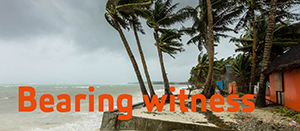AsiaPacificReport.nz
[embedded content]
TJ Aumua’s video report on youth’s fears over their homelands. PMC on Demand
By TJ Aumua
The effects of climate change on Pacific island nations like Samoa are leaving young people faced with uncertainty about being forced to leave their homelands and migrating to other countries.
The chair for Ōtara-Papatoetoe local board in Auckland, Fa’anānā Efeso Collins is also a former broadcaster and recently returned from Samoa.
 He “feels” for Pacific youth who are unsure about the existence of their homeland in the future.
He “feels” for Pacific youth who are unsure about the existence of their homeland in the future.
“There is a lot of fear about whether or not they will be able to have their own children, their own families and grow up safety in Samoa over the next few decades,” he told Asia Pacific Report.
“We know that in countries like Kiribati, Nauru and Tuvalu, there’s been more international travel – so they’ve migrated more in the last 10 years than any other period in their history. I think Samoan young people are starting to think about the same thing.”
This is ironic for Pacific Islanders living in New Zealand, with hopes of many eventually to return back home.
But Fa’anānā says that with the increasing impact of climate change there may not be a home to go back to.
“I know for New Zealand-born Samoans like myself, we often talk about wanting to go back, or our parents retiring back to Samoa because the land is special to our parents generation – and it’s special to us.
“We are going to lose that sense of ‘specialness’ if we are thinking whether we are safer long-term in New Zealand.”
Health impacts
Unknown to many outside the region, climate change also has major health impacts and is contributing to the level of illnesses in the Pacific.
Fa’anānā says the health ministries in Samoa are focusing on infections like malaria, typhoid and dengue fever, which are all, transmitted by mosquitos.
‘You pick illnesses up a whole lot easier because of cyclonic activity,’ he said. ‘So the ministry is looking at how to dry up large areas of waste water where mosquitos breed’.
“And in Samoa they don’t have the western, first-world facilities to be able to deal on mass with those issues.”
Fa’anānā says the World Health Organisation (WHO) is working with the health ministry in Samoa to address diseases enhanced by climate change.
“When you are living with those sorts of things in the back the your mind, of course you are going to think about moving countries, for long term investment.”
Fa’anānā says New Zealand’s response to Pacific climate change is slow and both Pacific and mainstream media outlets need to bring this issue to the forefront.
“New Zealand can do it,” he says.
“We are a good community, we can care enough about each other, and now it’s just about us being relaxed enough to say, ‘yeah lets join together and support what’s going on in the Pacific’.”
–]]>




